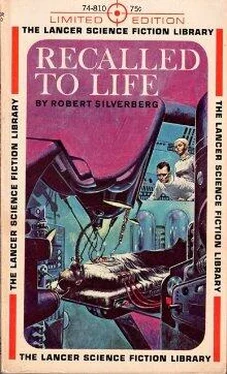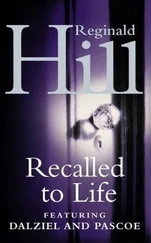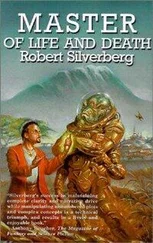The situation exposed a new facet of the already-explosive reanimation situation. Can wilful refusal to undergo reanimation be considered suicide? According to time-honored principles of law, suicide or attempted suicide is an illegal act. In this case, the odd paradox arises of a man already dead committing what can only be termed suicide. Should reanimation be given the cachet of legal approval during the forthcoming Congressional hearings, then it is clear that a testament forbidding reanimation will reach beyond the grave to bind the dead man’s survivors, counsel, and physicians in a conspiracy to abet suicide.
Obviously this is an impossible state of affairs. It demonstrates once again that the staggering Seller Laboratories success, which renders death in many cases merely temporary, will unavoidably bring about a massive revolution in our codes of legal and medical ethics, and indeed a change in our entire manner of life.
As he looked through the heap of newspapers, Marker began to feel that the tide was turning. The hysteria was dying down. Men were realizing that reanimation was no grisly joke, no hoax, but something real that had been developed and which could not be stamped out.
There were relatively few cries for wholesale suppression of the process. A Fundamentalist minister from Kansas had got his name into the papers by demanding immediate destruction of all equipment and plans for reanimation apparatus, but his was an isolated voice.
The tone of the Star-Post editorial seemed to be the tone of the consensus. Men of intelligence were saying, Reanimation exists, for good or evil. Let’s study it for a while and find out what it can do and how it will change society. Let’s not scream, for its suppression, but let’s not unleash it entirely before we know what we’re letting loose.
The most authoritative of the secular anti-reanimation voices had belonged to Clyde Thurrnan, and that voice now was stilled. The act had been one of colossal audacity and thoughtlessness, and even now Harker found it difficult to endure the memory of the noble old warrior’s mindless eyes; but, he had to admit, it had silenced a potent force for suppression.
Perhaps these were times for violence and audacity, Harker thought.
In that case I’m the wrong man for my job. But it’s too late to help that now.
Sunday’s papers continued the general trend toward reasonable consideration of the reanimation case, and also reported no progress in the search for the missing senator. It was learned that the reanimation hearings would begin as scheduled on Monday—not in Washington, though, but in New York. Late Sunday evening a messenger appeared at Harker’s door and handed him a document.
It was a subpoena, requesting him to be present at 10:00 the following morning at the Hotel Manhattan, where the Congressional hearings would begin.
Harker arrived there half an hour early. The hearings were taking place in a meeting-room on the nineteenth floor of the big hotel. Federal law required the presence of the press at Congressional hearings; television cameras were already set up, and at the back of the room Harker saw the four senators who had visited the labs: Brewster, Vorys, Dixon, Westmore. Two American-Conservatives, two Nationa Liberals. The fifth seat had been left vacant, obviously for Thurman; but Thurman would not be likely to take part in the hearings, though only a few men knew that fact with any certainty.
Mart Raymond was there already, wearing not his stained lab smock but a surprisingly natty tweed suit. Vogel had been subpoenaed too, but not Lurie. Next to Raymond sat a plumpish woman Harker had never seen before; she was middle-aged and dressed in an obsolete fashion.
“Jim, I want you to meet someone,” Raymond called to him as soon as Harker entered. He crossed the room to the front row of seats and Raymond said, “This is Mrs. Beller. She’s acting as representative for the Beller Fund since Barchet died.”
“Dreadful, about poor Mr. Barchet,” the woman said, in a highly masculine baritone. “Pleased to meet you, Mr. Harker. I’ve heard so much about you. My late husband was deeply intersted in your career.”
I’m damned sure of that, Harker thought. For as many years as he could remember, the name of Darwin F. Beller had headed the list of contributors to the annual American-Conservative Party campaign fund. He said aloud, “How do you do, Mrs. Beller.”
He looked toward the platform where the senators sat. Brewster looked grim, Vorys peeved; Dixon and Westmore, the Nat-Lib members of the commission, both wore identical uneasy smiles.
Television cameramen seemed to be under foot everywhere, checking camera angles, adjusting mike booms, testing the lighting. A small, harried-looking man with close-cropped hair came scurrying up to him, jabbed a microphone under his nose, and said, “Mr. Harker, would you mind saying a couple of words into this?”
“What do you want me to say?”
“That’s fine, sir. Now you, Mr. Raymond, and then after that I’d like to hear the lady speak.”
It was a voice-test. Someone yelled out, “Harker’s fine! Raymond could stand more resonance!”
“Would you mind getting more chest into your voice, Mr. Raymond?”
“I’ll do my best,” Raymond said.
The man with the microphone scurried away.
Harker watched the time on the big clock above the dais. Ten minutes to ten. The room was slowly filling up, not only with newspapermen. Raymond pointed out a couple of well-known medical men; Harker spotted two lawyers, including one who had issued a ringing denunciation of reanimation a week before.
At ten sharp Senator Westmore rose, smiled apologetically at the video camera, and said, “Good morning, ladies and gentlemen. As acting chairman of the Senate Special Investigating Committee dealing with the problem of the discoveries of the Beller Research Laboratories, I hereby ask for your attention and call this hearing to order.”
The room fell silent. In the hush, the throbbing purr of the official stenographer’s recording machine was clearly audible. After a pause Westmore went on, “We begin this session in the absence of our chairman, Senator Thurman of New York. I’m sure you’ll all join me in the hope that the beloved senator is safe, wherever he is, and that his unusual absence will soon be explained. However, the—shall we say—delicate nature of the Beller discoveries makes it imperative that this Committee elicit facts and present its findings to Congress immediately, and so we are proceeding on schedule despite our chairman’s absence.
“Our purpose is to draw forth information on the subject of reanimation. First I think it is well to question the director of the laboratory which developed the technique, Dr. Martin Raymond.”
Raymond rose, a trifle awkwardly, and as he did so Senator Vorys requested permission to question him. Permission was granted.
Vorys said, in this thin, penetrating voice, “Dr. Raymond, you recognize me, do you not, as a member of the group of United States Senators who visited your laboratories recently?
“I recognize you. You were there.”
“In our presence you applied your reanimation technique to a twelve-year-old boy. Am I correct?”
“You are.”
“The boy was dead?”
“He had drowned the day before.”
“And where is this boy now?”
Raymond said, “Recuperating from the aftereffects of his experience. He’s in good health, but still pretty weak.”
“Ah. Would it be possible for you to bring this boy to a session of this Committee?”
“I don’t believe so, Senator. The boy’s not ready for any travelling yet. And it would violate our policy to present him to the video audience. We try to keep the identity of our patients secret.”
Читать дальше












